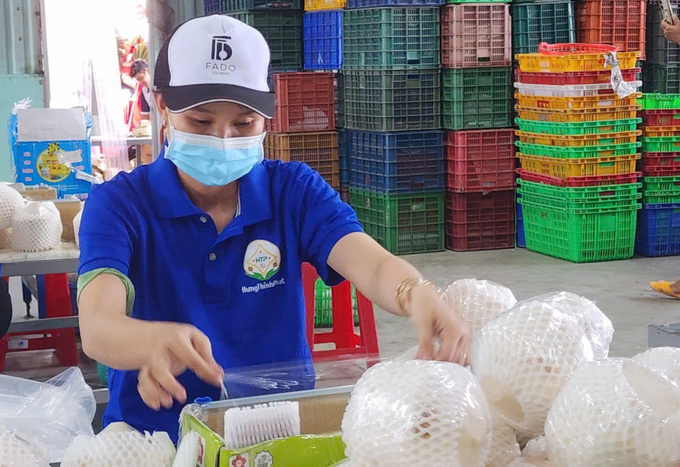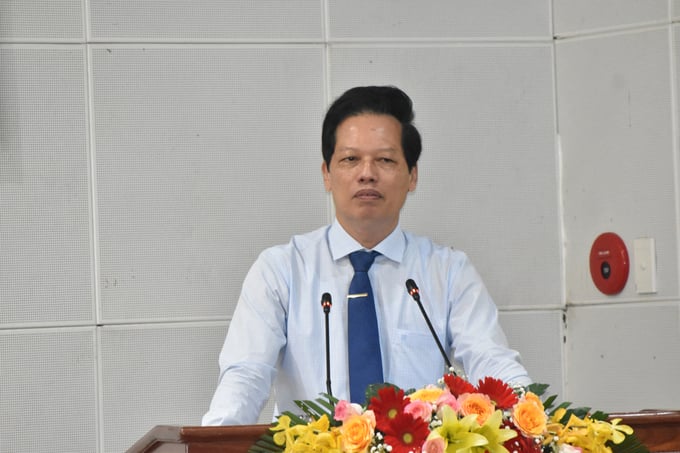June 21, 2025 | 11:01 GMT +7
June 21, 2025 | 11:01 GMT +7
Hotline: 0913.378.918
June 21, 2025 | 11:01 GMT +7
Hotline: 0913.378.918
Coconut cultivation encompasses approximately 22,500 hectares, of which 19,400 hectares are currently in the harvesting phase, resulting in an annual output of approximately 246,000 tons. Nine packaging facilities and 47 production unit codes are available in the province to facilitate exports to China. Furthermore, there are over 140 facilities and three enterprises that are involved in the procurement, preliminary processing, and production of coconut products.
The primary source of Tien Giang's coconut export turnover, which amounted to USD 5.595 million as of November of this year, was processed products. The principal export markets are the United States, Canada, Chile, China, and South Korea. Tien Giang attained a significant milestone on October 25, 2024, when it dispatched its first official shipment of 67.5 tons of fresh coconuts to China.

Tien Giang has a large coconut area, about 22,000 hectares, most of which is fresh coconut, with great export potential. Photo: Minh Dam.
The province, neighboring regions, and Ho Chi Minh City are the primary destinations for raw coconut consumption domestically. Businesses within and outside the province receive dried coconuts for further processing. Nevertheless, the majority of coconut products are subject to the preliminary and processing phases, frequently fulfilling orders from enterprises in the neighboring Ben Tre province.
This week, the International Cooperation Department (MARD) held a forum in My Tho City, Tien Giang, to attract foreign direct investment and improve the coconut industry's potential. Tien Giang urged both domestic and foreign investors to engage in agricultural processing and exports during the forum.
Mr. Luu Van Phi, Director of the Department of Industry and Trade of Tien Giang, delineated the province's investment requirements, which include the expansion of cultivation areas, the implementation of advanced technologies, the enhancement of post-harvest processing, and the development of essential infrastructure, including storage, preservation facilities, transportation, and logistics. Furthermore, the province endeavors to promote vocational training programs and human resource development.
Mr. Luu Van Phi stated, "Investing in agriculture, particularly in Tien Giang's coconut industry, presents immense opportunities, particularly when incorporating high-tech agriculture and advanced processing." "Investment promotion will increase the value of products, broaden export markets, and contribute to the sustainable development of agriculture in Tien Giang."

Mr. Nguyen Thanh Dieu, Vice Chairman of Tien Giang Provincial People's Committee, said that coconut trees play an important role in the lives of Tien Giang people. Photo: Minh Dam.
Ms. Tran Thi Be Bay, the Deputy Director of the Department of Agriculture and Rural Development (DARD), emphasized the province's commitment to the sustainable development of the coconut industry, with a particular emphasis on organic practices. At present, the province is cultivating only 500 hectares organically; however, it intends to increase this area to 3,000 hectares. Plans are also in progress to establish an additional 163 plantation areas, which will occupy an estimated 7,000 hectares, in order to satisfy market demands.
The DARD has recommended that the provincial government employ policies that encourage investments in the cultivation of coconuts and the production of general produce. The following are incentives for enterprises and producers to establish infrastructure that satisfies export criteria.
Mr. Nguyen Thanh Dieu, the Deputy Director of the Tien Giang People's Committee, underscored the coconut tree's importance in the livelihoods of local residents. Farmers, with the assistance of agricultural authorities, have implemented scientific and technological innovations to enhance the quality of coconuts and satisfy international export standards.
Tien Giang strives to establish a stable and resilient coconut value chain from production to consumption by organizing events such as this forum, which facilitate the connection between businesses and investors. "Our producers are proficient in coconut cultivation and are prepared to adhere to the technical standards required by investors and export markets," stated Mr. Nguyen Thanh Dieu.
The province's proactive approach to promoting international collaboration, sustainability, and innovation is indicative of its aspiration to establish Tien Giang as a global and regional leader in the coconut industry.
Currently, the province has policy mechanisms in place to attract investment in agriculture, including Resolution 07/2019/NQ-HDND dated July 12, 2019, Resolution No. 04/2015/QD-UBND dated December 9, 2015, Decision No. 06/2021/QD-UBND dated March 30, 2021, Plan to implement Decision 1322/QD-TTg dated August 31, 2020 of the Prime Minister, and Plan 150/KH-UBND dated June 14, 2021 of the Provincial People's Committee on implementing Decision 174/QD-TTg of the Prime Minister.
Translated by Linh Linh

(VAN) The waste of resources from agricultural by-products and the situation of counterfeit and poor quality goods in production causing losses of thousands of billions were pointed out by the National Assembly deputy.

(VAN) After 5 years of implementation, the CAI initiative has helped coffee growers change their farming practices, moving toward responsible agriculture that meets global export standards.

(VAN) The primary prerequisite for the comprehensive and robust integration of Vietnam's livestock sector into the global value chain is the establishment of a disease control system.

(VAN) The results of national programs are essential for establishing a contemporary livestock sector that is well-equipped to meet the demands of both domestic and international markets, with robust biosafety standards.

(VAN) The UNESCO Global Geopark revalidation of Non nuoc Cao Bang and the transition to a two-tier administrative model are presently undergoing a pivotal moment in Cao Bang, the northernmost province of Vietnam.
/2025/06/13/5330-2-004539_953.jpg)
(VAN) Changing policy mindset and removing investment barriers are urgent requirements to open up new development space for enterprises in the agricultural sector.

(VAN) The areas include the restoration of five million hectares of marine ecosystems.